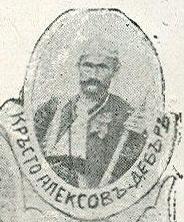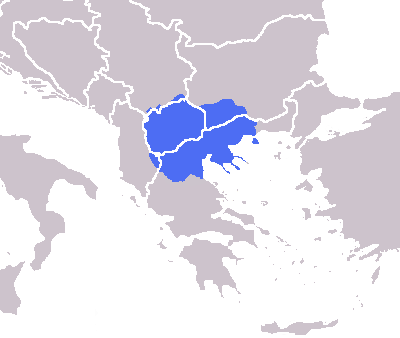|
Krsto Aleksov
Krsto Aleksov (, ; 1877-unknown) was a Macedonian Bulgarian revolutionary of the Internal Macedonian Revolutionary Organization. He is considered an ethnic Macedonian in North Macedonia. Biography Aleksov was born in the Ottoman village of Herebel (present-day Albania). As a young man he emigrated to Bulgaria and from 1898 to the spring of 1902 Aleksov lived in Ruse. Here he received a military training in the local ''rifle company''. During the Ilinden Uprising, Aleksov served in a cheta in the Galičnik region. As a revolutionary, later he was active in the Kičevo region. In 1909, he was treated in Sofia, after which he returned to Ottoman Macedonia. Aleksov married Neda Arsova in October 1909 in Kičevo. The last information about him is from a 1918 survey held by the Macedonian Brotherhoods in Bulgaria, when Serbian annexed-Vardar Macedonia Vardar Macedonia (Macedonian language, Macedonian and ) is a historical term referring to the central part of the broader Macedo ... [...More Info...] [...Related Items...] OR: [Wikipedia] [Google] [Baidu] |
Cheta (armed Group)
Cheta may refer to: * Cheta (armed group), a type of armed band of the Ottoman Balkans * Chaeta, part of some invertebrates' anatomy * Cheta (woreda), an administrative division of Ethiopia * Cheta, SBS Nagar, a village in India * Cheta language, a language of Brazil * Cheta Emba (born 1993), American rugby player * Cheta Ozougwu (born 1988), American football player * "Cheta", a 2016 song by Ada Ehi See also * Ceta (other) * Cheeta * Chita (other) * Chetan (other) * Kheta (other) * Chetniks (other) {{Disambiguation ... [...More Info...] [...Related Items...] OR: [Wikipedia] [Google] [Baidu] |
Year Of Death Missing
A year is a unit of time based on how long it takes the Earth to orbit the Sun. In scientific use, the tropical year (approximately 365 solar days, 5 hours, 48 minutes, 45 seconds) and the sidereal year (about 20 minutes longer) are more exact. The modern calendar year, as reckoned according to the Gregorian calendar, approximates the tropical year by using a system of leap years. The term 'year' is also used to indicate other periods of roughly similar duration, such as the lunar year (a roughly 354-day cycle of twelve of the Moon's phasessee lunar calendar), as well as periods loosely associated with the calendar or astronomical year, such as the seasonal year, the fiscal year, the academic year, etc. Due to the Earth's axial tilt, the course of a year sees the passing of the seasons, marked by changes in weather, the hours of daylight, and, consequently, vegetation and soil fertility. In temperate and subpolar regions around the planet, four seasons are ... [...More Info...] [...Related Items...] OR: [Wikipedia] [Google] [Baidu] |
People From The Ottoman Empire
The term "the people" refers to the public or common mass of people of a polity. As such it is a concept of human rights law, international law as well as constitutional law, particularly used for claims of popular sovereignty. In contrast, a people is any plurality of persons considered as a whole. Used in politics and law, the term "a people" refers to the collective or community of an ethnic group or nation. Concepts Legal Chapter One, Article One of the Charter of the United Nations states that "peoples" have the right to self-determination. Though the mere status as peoples and the right to self-determination, as for example in the case of Indigenous peoples (''peoples'', as in all groups of indigenous people, not merely all indigenous persons as in ''indigenous people''), does not automatically provide for independent sovereignty and therefore secession. Indeed, judge Ivor Jennings identified the inherent problems in the right of "peoples" to self-determination, as i ... [...More Info...] [...Related Items...] OR: [Wikipedia] [Google] [Baidu] |
1877 Births
Events January * January 1 – Queen Victoria is proclaimed Empress of India by the Royal Titles Act 1876, introduced by Benjamin Disraeli, the Prime Minister of the United Kingdom . * January 8 – Great Sioux War of 1876: Battle of Wolf Mountain – Crazy Horse and his warriors fight their last battle with the United States Cavalry in Montana. * January 20 – The Conference of Constantinople ends, with Ottoman Turkey rejecting proposals of internal reform and Balkan provisions. * January 29 – The Satsuma Rebellion, a revolt of disaffected samurai in Japan, breaks out against the new imperial government; it lasts until September, when it is crushed by a professionally led army of draftees. February * February 17 – Major General Charles George Gordon of the British Army is appointed Governor-General of the Sudan. March * March 2 – Compromise of 1877: The 1876 United States presidential election is resolved with the selection of Ru ... [...More Info...] [...Related Items...] OR: [Wikipedia] [Google] [Baidu] |
Members Of The Internal Macedonian Revolutionary Organization
Member may refer to: * Military jury, referred to as "Members" in military jargon * Element (mathematics), an object that belongs to a mathematical set * In object-oriented programming, a member of a class ** Field (computer science), entries in a database ** Member variable, a variable that is associated with a specific object * Limb (anatomy), an appendage of the human or animal body ** Euphemism for penis * Structural component of a truss, connected by nodes * User (computing), a person making use of a computing service, especially on the Internet * Member (geology), a component of a geological formation * Member of parliament * The Members, a British punk rock band * Meronymy, a semantic relationship in linguistics * Church membership, belonging to a local Christian congregation, a Christian denomination and the universal Church * Member, a participant in a club or learned society A learned society ( ; also scholarly, intellectual, or academic society) is an organizatio ... [...More Info...] [...Related Items...] OR: [Wikipedia] [Google] [Baidu] |
Bulgarian Occupation Of Serbia (World War I)
The Bulgarian occupation of Serbia during World War I started in Autumn 1915 following the Serbian campaign (1915), invasion of Serbia by the combined armies of German Empire, Germany, Austria-Hungary and Kingdom of Bulgaria, Bulgaria. After Kingdom of Serbia, Serbia's defeat and the Great Retreat (Serbia), retreat of its forces across Albania, the country was divided into Bulgarian and Austro-Hungarian occupation of Serbia, Austro-Hungarian occupation zones. The Bulgarian occupation zone extended from modern-day Southern and Eastern Serbia, Kosovo and North Macedonia. The civilian population was exposed to various measures of repression, including mass internment, Unfree labour, forced labor, and a Bulgarisation policy. According to academic Paul Mojzes: "it appears that ethnic cleansing (at a minimum) and genocide (at the maximum) did take place between 1915 and 1918", what historian Alan Kramer has termed a: "dynamic of destruction". The occupation ended in late September 19 ... [...More Info...] [...Related Items...] OR: [Wikipedia] [Google] [Baidu] |
Vardar Macedonia
Vardar Macedonia (Macedonian language, Macedonian and ) is a historical term referring to the central part of the broader Macedonian region, roughly corresponding to present-day North Macedonia. The name derives from the Vardar, Vardar River and is primarily associated with the period of Kingdom of Serbia, Serbian (1912–1918) and later Yugoslavia, Yugoslav rule (1918–1991). History Vardar Macedonia refers to the central part of the broader Macedonia (region), Macedonian region, which became part of the Kingdom of Serbia following the Balkan Wars (1912–1913) and was formally assigned to Serbia by the Treaty of Bucharest (1913), Treaty of Bucharest. It was named after the Vardar, Vardar River, distinguishing it from Aegean Macedonia in Greece and Pirin Macedonia in Bulgaria. The region was initially known as Serbian Macedonia although the use of the name ''Macedonia'' was prohibited later in the Kingdom of Yugoslavia, due to the implemented policy of Serbianisation of the loca ... [...More Info...] [...Related Items...] OR: [Wikipedia] [Google] [Baidu] |
Kingdom Of Serbia
The Kingdom of Serbia was a country located in the Balkans which was created when the ruler of the Principality of Serbia, Milan I of Serbia, Milan I, was proclaimed king in 1882. Since 1817, the Principality was ruled by the Obrenović dynasty (replaced by the Karađorđević dynasty for a short time). The Principality, under the suzerainty of the Ottoman Empire, ''de facto'' achieved full independence when the very last Ottoman troops left Belgrade in 1867. The Treaty of Berlin (1878), Congress of Berlin in 1878 recognized the formal independence of the Principality of Serbia, and in its composition Nišava District, Nišava, Pirot District, Pirot, Toplica District, Toplica and Vranje districts entered the Southern and Eastern Serbia, South part of Serbia. In 1882, Serbia was elevated to the status of a kingdom, maintaining a foreign policy friendly to Austria-Hungary. Between 1912 and 1913, Serbia greatly enlarged its territory through engagement in the First Balkan War, Fi ... [...More Info...] [...Related Items...] OR: [Wikipedia] [Google] [Baidu] |
Sofia
Sofia is the Capital city, capital and List of cities and towns in Bulgaria, largest city of Bulgaria. It is situated in the Sofia Valley at the foot of the Vitosha mountain, in the western part of the country. The city is built west of the Iskar (river), Iskar river and has many mineral springs, such as the Sofia Central Mineral Baths. It has a humid continental climate. Known as Serdica in Classical antiquity, antiquity, Sofia has been an area of human habitation since at least 7000 BC. The recorded history of the city begins with the attestation of the conquest of Serdica by the Roman Republic in 29 BC from the Celtic settlement of Southeast Europe, Celtic tribe Serdi. During the decline of the Roman Empire, the city was raided by Huns, Visigoths, Pannonian Avars, Avars, and Slavs. In 809, Serdica was incorporated into the First Bulgarian Empire by Khan (title), Khan Krum and became known as Sredets. In 1018, the Byzantine Empire, Byzantines ended Bulgarian rule until 1194, ... [...More Info...] [...Related Items...] OR: [Wikipedia] [Google] [Baidu] |
Kičevo
Kičevo ( ; , sq-definite, Kërçova) is a city in the western part of North Macedonia, located in a valley in the south-eastern slopes of Mount Bistra, between the cities of Ohrid and Gostivar. The capital Skopje is 112 km away. The city of Kičevo is the seat of Kičevo Municipality. Name The name of the city in Macedonian and other South Slavic languages is ''Kičevo'' (Кичево). The name of the city in Albanian is ''Kërçovë''. It was originally known as Uskana and was inhabited by the Illyrian tribe of the Penestae. It is presumed that the present name of the town originates from the name of this settlement populated by the Slavic Berziti tribe. In Turkish, the city is known as ''Kırçova''. Kicevo was first mentioned as ''Uskana'' (Ωξάνα in Ancient Greek) in the reign of Perseus, king of Macedon during the Third Macedonian War (171–169 BC). The next written record of the town did not come until 1018, under the name of ''Kitzabis'' (from Kίτζ ... [...More Info...] [...Related Items...] OR: [Wikipedia] [Google] [Baidu] |
Galičnik
Galičnik () is a mountain village in North Macedonia and along with Lazaropole is one of the two biggest and oldest Mijak villages in the region. Galičnik has well-preserved traditional architecture, including an amphitheater in the village square, and is famous for its surrounding countryside and nature reserve. The village is known for the Galička Svadba, a traditional wedding custom held annually in summer (in July), on the day of the village feast of the Patron Saint – '' Petrovden'' ( St. Peter's day). During the wedding, local men will dance the " Teškoto" (the ''"hard"'' or ''"heavy"''). History Galičnik has traditionally been identified as a Mijak village. Galičnik (''Galiçnik'') is attested in the Ottoman ''defter'' of 1467 as a village in the ziamet of Reka which was under the authority of Karagöz Bey. The village appears as uninhabited. At the end of the 19th century, Galičnik was a large Bulgarian palanka , with its inhabitants engaged in masonry and ... [...More Info...] [...Related Items...] OR: [Wikipedia] [Google] [Baidu] |






